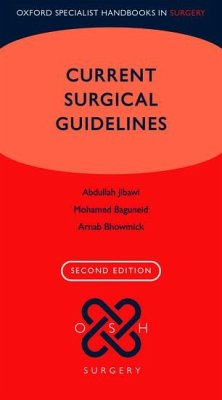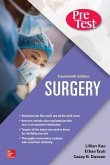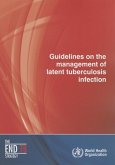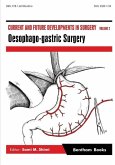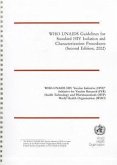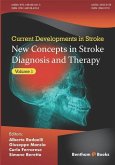- Broschiertes Buch
- Merkliste
- Auf die Merkliste
- Bewerten Bewerten
- Teilen
- Produkt teilen
- Produkterinnerung
- Produkterinnerung
New edition of a concise easily accessible summary of all currently available surgical guidelines. First line recommendations for investigations and treatment including level of supporting evidence
Andere Kunden interessierten sich auch für
![Surgery Pretest Self-Assessment and Review, Fourteenth Edition Surgery Pretest Self-Assessment and Review, Fourteenth Edition]() Lillian KaoSurgery Pretest Self-Assessment and Review, Fourteenth Edition62,99 €
Lillian KaoSurgery Pretest Self-Assessment and Review, Fourteenth Edition62,99 €![Guidelines on the Management of Latent Tuberculosis Infection Guidelines on the Management of Latent Tuberculosis Infection]() World Health OrganizationGuidelines on the Management of Latent Tuberculosis Infection20,99 €
World Health OrganizationGuidelines on the Management of Latent Tuberculosis Infection20,99 €![Local Anesthesia and Extractions for Dental Students: Simple Notes and Guidelines Local Anesthesia and Extractions for Dental Students: Simple Notes and Guidelines]() Esam OmarLocal Anesthesia and Extractions for Dental Students: Simple Notes and Guidelines139,99 €
Esam OmarLocal Anesthesia and Extractions for Dental Students: Simple Notes and Guidelines139,99 €![Current and Future Developments in Surgery Volume 2 Current and Future Developments in Surgery Volume 2]() Sami M ShimiCurrent and Future Developments in Surgery Volume 2126,99 €
Sami M ShimiCurrent and Future Developments in Surgery Volume 2126,99 €![Who-Unaids Guidelines for Standard HIV Isolation and Characterization Procedures Who-Unaids Guidelines for Standard HIV Isolation and Characterization Procedures]() Who-Unaids Hiv Vaccine InitiativeWho-Unaids Guidelines for Standard HIV Isolation and Characterization Procedures34,99 €
Who-Unaids Hiv Vaccine InitiativeWho-Unaids Guidelines for Standard HIV Isolation and Characterization Procedures34,99 €![New Concepts in Stroke Diagnosis and Therapy, (Current Developments in Stroke, Volume 1) New Concepts in Stroke Diagnosis and Therapy, (Current Developments in Stroke, Volume 1)]() New Concepts in Stroke Diagnosis and Therapy, (Current Developments in Stroke, Volume 1)128,99 €
New Concepts in Stroke Diagnosis and Therapy, (Current Developments in Stroke, Volume 1)128,99 €![Current Studies in HIV Research Current Studies in HIV Research]() Seyed Ahmad Seyed AlinaghiCurrent Studies in HIV Research128,99 €
Seyed Ahmad Seyed AlinaghiCurrent Studies in HIV Research128,99 €-
-
-
New edition of a concise easily accessible summary of all currently available surgical guidelines. First line recommendations for investigations and treatment including level of supporting evidence
Hinweis: Dieser Artikel kann nur an eine deutsche Lieferadresse ausgeliefert werden.
Hinweis: Dieser Artikel kann nur an eine deutsche Lieferadresse ausgeliefert werden.
Produktdetails
- Produktdetails
- Verlag: Hurst & Co.
- 2nd edition
- Seitenzahl: 592
- Erscheinungstermin: 19. September 2018
- Englisch
- Abmessung: 178mm x 102mm x 23mm
- Gewicht: 318g
- ISBN-13: 9780198794769
- ISBN-10: 0198794762
- Artikelnr.: 51254701
- Herstellerkennzeichnung
- Libri GmbH
- Europaallee 1
- 36244 Bad Hersfeld
- 06621 890
- Verlag: Hurst & Co.
- 2nd edition
- Seitenzahl: 592
- Erscheinungstermin: 19. September 2018
- Englisch
- Abmessung: 178mm x 102mm x 23mm
- Gewicht: 318g
- ISBN-13: 9780198794769
- ISBN-10: 0198794762
- Artikelnr.: 51254701
- Herstellerkennzeichnung
- Libri GmbH
- Europaallee 1
- 36244 Bad Hersfeld
- 06621 890
Abdullah Jibawi received his medical degree from the University of Damascus. He received a Masters degree in surgery, then joined UK training in general and vascular surgery before completing a structured SpR surgical training in the East Midlands Deanery (University of Leicester), and undertaking a two year fellowship in vascular and endovascular surgery at the Royal Free Hospital NHS Foundation Trust and the University College London Hospital. Mr Jibawi received his FRCS (General/Vascular) in 2013, and obtained his Specialist License from the General Medical Council in the fields of vascular diseases, aortic surgery and endovascular surgery. He commenced his vascular surgical practice as a Consultant Vascular Surgeon at Ashford and St Peter's Hospitals NHS Foundation Trust in Oct 2013. Mr Jibawi was awarded a Doctorate Degree for his academic work on developing better methods in improving outcome in vascular surgery, a joint work between Oxford, Sussex Brighton Universities. Mohamed Baguneid is a consultant vascular surgeon at University Hospital South Manchester, UK. He specialises in all branches of vascular surgery including management of peripheral vascular disease, carotid surgery, diabetic foot surgery and aneurysms. Prof Bagunied became a consultant vascular surgeon at University Hospital South Manchester in 2006 and took the role of Academic Foundation Programme lead followed by the Royal College of Surgeons Tutor a year later. He was subsequently appointed as North West Deanery Core Surgical Education Lead, and was appointed clinical director of vascular surgery in University Hospital South Manchester in 2009. In April 2012, he was appointed Deputy Medical Director of clinical strategy and developed greater insight into large-scale NHS changes, and has previously worked as a chief of vascular surgery and chief of general surgery in Abu Dhabi. Most recently, he has taken a senior clinical leadership role as Medical Director of the South Sector Partnership. Mr Arnab Bhowmick graduated from Manchester University before completing basic surgical training and being awarded Fellowship of the Royal College of Surgeons of Edinburgh in 1996. Mr Bhomwick completed Higher Surgical training the same year and worked in various hospitals in the North West as well as two years in full time surgical research at Withington Hospital. He was awarded the Intercollegiate Fellowship of the Royal College of Surgeons and the Certificate of Completion of Specialist Training in 2005, before embarking on additional training in laparoscopic colorectal surgery. Mr Bhomwick was appointed Consultant Colorectal / General Surgeon at Lancashire Teaching Hospitals NHS Foundation Trust in 2009 and is developing minimally invasive surgery.
1. Principles of evidence-based medicine
1: Principles of evidence-based medicine
2. General care of the surgical patient
2: Principles of good surgical practice
3: Medico-legal aspects of surgical practice
4: Principles of admission management
5: Day case surgery
6: Good consent practice
7: Preoperative assessment
8: Perioperative fasting
9: Perioperative medical complications
10: Principles of wound care
11: Preoperative assessment of bleeding risk
12: Venous thromboembolism
13: Principles of infective endocarditis
14: Principles of blood transfusion
15: Perioperative anticoagulation management
16: Principles of care of critically ill patients
17: Principles of trauma management
18: Sepsis and septic shock
19: Antibiotic prophylaxis in surgery
20: Principles of infection control
21: Principles of pain management
22: Principles of nutritional support
3. Oesophagus
23: Gastro-oesophageal reflux disease (GORD)
24: Ingestion of foreign bodies
25: Achalasia
26: Oesophageal cancer
27: Barrett's oesophagus
28: Management of oesophageal variceal haemorrhage
4. Stomach and duodenum
29: Peptic ulcer disease
30: Gastric cancer
31: Neuroendocrine tumours
32: Surgery for obesity
5. Small bowel and appendix
33: Acute appendicitis
6. Colorectal
34: Constipation in adults
35: Diverticular disease
36: Anal fissures
37: Haemorrhoid disease
38: Colorectal cancer
7. Pancreas
39: Acute pancreatitis
40: Chronic pancreatitis
41: Pancreatic cancer
8. Hepatobiliary
42: Gallstone disease
43: Surgical management of liver metastasis
44: Hepatocellular carcinoma (HCC) and Hepatic Hydatid Disease (HHD)
9. Spleen
45: Prevention of post-splenectomy sepsis (PSS)
10. Vascular
46: Chronic limb ischaemia
47: Carotid artery stenosis
48: Abdominal aortic aneurysm (AAA)
49: Chronic venous insufficiency (CVI)
11. Breast
50: Breast cancer
51: Benign breast diseases
12. Endocrine
52: Thyroid nodules and cancer
53: Surgery for hyperparathyroidism
13. Hernia
54: Abdominal wall hernias
14. Skin
55: Principles of skin malignancies management
1: Principles of evidence-based medicine
2. General care of the surgical patient
2: Principles of good surgical practice
3: Medico-legal aspects of surgical practice
4: Principles of admission management
5: Day case surgery
6: Good consent practice
7: Preoperative assessment
8: Perioperative fasting
9: Perioperative medical complications
10: Principles of wound care
11: Preoperative assessment of bleeding risk
12: Venous thromboembolism
13: Principles of infective endocarditis
14: Principles of blood transfusion
15: Perioperative anticoagulation management
16: Principles of care of critically ill patients
17: Principles of trauma management
18: Sepsis and septic shock
19: Antibiotic prophylaxis in surgery
20: Principles of infection control
21: Principles of pain management
22: Principles of nutritional support
3. Oesophagus
23: Gastro-oesophageal reflux disease (GORD)
24: Ingestion of foreign bodies
25: Achalasia
26: Oesophageal cancer
27: Barrett's oesophagus
28: Management of oesophageal variceal haemorrhage
4. Stomach and duodenum
29: Peptic ulcer disease
30: Gastric cancer
31: Neuroendocrine tumours
32: Surgery for obesity
5. Small bowel and appendix
33: Acute appendicitis
6. Colorectal
34: Constipation in adults
35: Diverticular disease
36: Anal fissures
37: Haemorrhoid disease
38: Colorectal cancer
7. Pancreas
39: Acute pancreatitis
40: Chronic pancreatitis
41: Pancreatic cancer
8. Hepatobiliary
42: Gallstone disease
43: Surgical management of liver metastasis
44: Hepatocellular carcinoma (HCC) and Hepatic Hydatid Disease (HHD)
9. Spleen
45: Prevention of post-splenectomy sepsis (PSS)
10. Vascular
46: Chronic limb ischaemia
47: Carotid artery stenosis
48: Abdominal aortic aneurysm (AAA)
49: Chronic venous insufficiency (CVI)
11. Breast
50: Breast cancer
51: Benign breast diseases
12. Endocrine
52: Thyroid nodules and cancer
53: Surgery for hyperparathyroidism
13. Hernia
54: Abdominal wall hernias
14. Skin
55: Principles of skin malignancies management
1. Principles of evidence-based medicine
1: Principles of evidence-based medicine
2. General care of the surgical patient
2: Principles of good surgical practice
3: Medico-legal aspects of surgical practice
4: Principles of admission management
5: Day case surgery
6: Good consent practice
7: Preoperative assessment
8: Perioperative fasting
9: Perioperative medical complications
10: Principles of wound care
11: Preoperative assessment of bleeding risk
12: Venous thromboembolism
13: Principles of infective endocarditis
14: Principles of blood transfusion
15: Perioperative anticoagulation management
16: Principles of care of critically ill patients
17: Principles of trauma management
18: Sepsis and septic shock
19: Antibiotic prophylaxis in surgery
20: Principles of infection control
21: Principles of pain management
22: Principles of nutritional support
3. Oesophagus
23: Gastro-oesophageal reflux disease (GORD)
24: Ingestion of foreign bodies
25: Achalasia
26: Oesophageal cancer
27: Barrett's oesophagus
28: Management of oesophageal variceal haemorrhage
4. Stomach and duodenum
29: Peptic ulcer disease
30: Gastric cancer
31: Neuroendocrine tumours
32: Surgery for obesity
5. Small bowel and appendix
33: Acute appendicitis
6. Colorectal
34: Constipation in adults
35: Diverticular disease
36: Anal fissures
37: Haemorrhoid disease
38: Colorectal cancer
7. Pancreas
39: Acute pancreatitis
40: Chronic pancreatitis
41: Pancreatic cancer
8. Hepatobiliary
42: Gallstone disease
43: Surgical management of liver metastasis
44: Hepatocellular carcinoma (HCC) and Hepatic Hydatid Disease (HHD)
9. Spleen
45: Prevention of post-splenectomy sepsis (PSS)
10. Vascular
46: Chronic limb ischaemia
47: Carotid artery stenosis
48: Abdominal aortic aneurysm (AAA)
49: Chronic venous insufficiency (CVI)
11. Breast
50: Breast cancer
51: Benign breast diseases
12. Endocrine
52: Thyroid nodules and cancer
53: Surgery for hyperparathyroidism
13. Hernia
54: Abdominal wall hernias
14. Skin
55: Principles of skin malignancies management
1: Principles of evidence-based medicine
2. General care of the surgical patient
2: Principles of good surgical practice
3: Medico-legal aspects of surgical practice
4: Principles of admission management
5: Day case surgery
6: Good consent practice
7: Preoperative assessment
8: Perioperative fasting
9: Perioperative medical complications
10: Principles of wound care
11: Preoperative assessment of bleeding risk
12: Venous thromboembolism
13: Principles of infective endocarditis
14: Principles of blood transfusion
15: Perioperative anticoagulation management
16: Principles of care of critically ill patients
17: Principles of trauma management
18: Sepsis and septic shock
19: Antibiotic prophylaxis in surgery
20: Principles of infection control
21: Principles of pain management
22: Principles of nutritional support
3. Oesophagus
23: Gastro-oesophageal reflux disease (GORD)
24: Ingestion of foreign bodies
25: Achalasia
26: Oesophageal cancer
27: Barrett's oesophagus
28: Management of oesophageal variceal haemorrhage
4. Stomach and duodenum
29: Peptic ulcer disease
30: Gastric cancer
31: Neuroendocrine tumours
32: Surgery for obesity
5. Small bowel and appendix
33: Acute appendicitis
6. Colorectal
34: Constipation in adults
35: Diverticular disease
36: Anal fissures
37: Haemorrhoid disease
38: Colorectal cancer
7. Pancreas
39: Acute pancreatitis
40: Chronic pancreatitis
41: Pancreatic cancer
8. Hepatobiliary
42: Gallstone disease
43: Surgical management of liver metastasis
44: Hepatocellular carcinoma (HCC) and Hepatic Hydatid Disease (HHD)
9. Spleen
45: Prevention of post-splenectomy sepsis (PSS)
10. Vascular
46: Chronic limb ischaemia
47: Carotid artery stenosis
48: Abdominal aortic aneurysm (AAA)
49: Chronic venous insufficiency (CVI)
11. Breast
50: Breast cancer
51: Benign breast diseases
12. Endocrine
52: Thyroid nodules and cancer
53: Surgery for hyperparathyroidism
13. Hernia
54: Abdominal wall hernias
14. Skin
55: Principles of skin malignancies management

